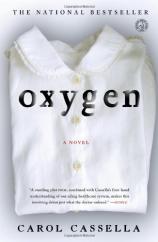Reading Group Guide
Discussion Questions
Oxygen

Consider the ethical dilemma presented in the book and discuss the responsibilities of physicians and hospitals. For more on medical ethics, visit the American Medical Association’s principles of medical ethics page.
Rather than buy the wine or food that your group would usually have, consider donating to a charity such as the one for which Marie works in the novel’s epilogue. Learn more by visiting the websites for Changing Faces or Facing the World.
1. After Jolene’s death, Marie thinks almost as much about Bobbie as she does about her own experience. Why is it so important for her to see Bobbie? What does she hope to accomplish?
2. Marie says that no death she has witnessed affects her as Jolene’s does, yet one experience was different: the death of her mother. How do you think learning of her mother’s condition and attempting to help her parents understand it while she was in medical school affects Marie as a doctor? How was the time of her mother’s death a turning point between the life she was raised for and the life she chose?
3. When Marie learns that the Turner Syndrome revealed in Jolene’s autopsy could make losing the case and therefore her career more likely, she wonders “if all the money and possessions were stripped away, what, exactly, would be left?” What choices does the case force Marie to reconsider? What doubts does she have about her life and career?
4. Discuss the relationship between Marie and her sister, Lori. Why doesn’t Marie tell Lori about what happened to Jolene immediately? What conflicting emotions does Marie have about Lori’s life and marriage?
5. When Marie and Joe are in the hotel in Texas, he describes his theory of the “Big O,” a theory that could apply to several characters in the book, perhaps Joe most of all. Why is it significant that Joe be the one to hold this hopeful belief? In what ways are each of the characters “cloaked”?
6. Marie’s father is literally going blind, and yet each of them is blind in a way, unable to see through their estrangement and past wrongs. What does Marie learn about how her father “sees” her during her visit? What does she “see” in him? What is the significance of the gift of her mother’s ring?
7. The balance between vulnerability and control functions on several levels in the novel: Between doctors and patients in the operating room, during the legal battle in the aftermath of Jolene’s death, and in Marie’s relationships with her father and Joe. What happens when the balance shifts in each situation? What does Marie learn about control within each context, or from each person?
8. Joe is one of the most surprising characters in the book. He buoys Marie up, he gives her strength, but in the end he is revealed as the weak one. Were Joe’s feelings for Marie genuine? Does his letter change your opinion of him? Ultimately, how does Marie feel about him?
9. Betrayal is an important theme in the book. Marie is betrayed by Joe and the hospital. Bobbie and Jolene are betrayed by them too. Marie’s father believes she betrayed him and his faith when she was a teenager,. What other betrayals can you think of? What motivation is at the root of each betrayal?
10. Consider the depictions of hospitals and doctors on television versus in Oxygen. How does the novel’s authentic portrayal of medical culture, its routines and its dilemmas, differ from what you see elsewhere?
11. The ending of the novel is particularly bittersweet. Marie’s innocence is intact, but Joe’s innocence, and her relationship with him, are undone. Were you surprised? Were you satisfied with this resolution?
Oxygen
- Publication Date: June 9, 2009
- Genres: Fiction
- Paperback: 320 pages
- Publisher: Simon & Schuster
- ISBN-10: 1416556117
- ISBN-13: 9781416556114








